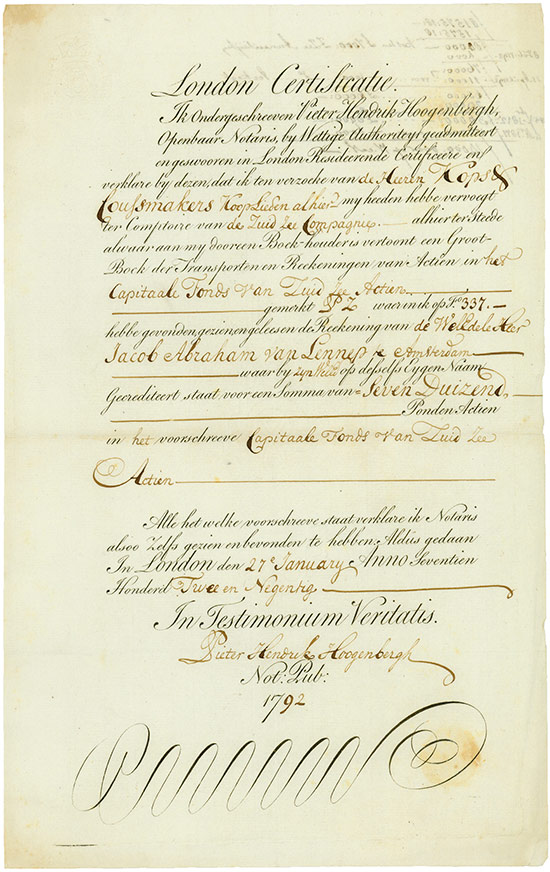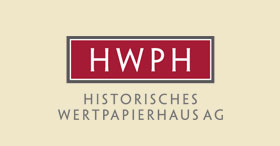Ingelsberg 17 b
D- 85604 Zorneding
Deutschland / Germany
Tel.: +49 (0)8106 - 2461-86
Fax: +49 (0)8106 - 2461-88
E-Mail: auktion@hwph.de
HWPH Historisches Wertpapierhaus AG –
O seu perito em acções antigas e história
do sector financeiro
|
||||
Lote |
595 | |||
Título |
Zuid Zee Compagnie | |||
Local/-is |
London | |||
País |
Großbritannien | |||
Região |
Europa | |||
Descrição |
London, 17.01.1792, London Certificate über Aktien im Wert von £ 7.000, #337, 34,5 x 21,7 cm, schwarz, beige, Druck auf Büttenpapier mit Wasserzeichen, Knickfalten, sonst EF, OU, uns bisher komplett unbekannte Rarität! | |||
Descrição (Inglês) |
London, 17 January 1792, London Certificate for shares value £ 7,000, #337, 34.5 x 21.7 cm, black, beige, printed on handmade paper with watermark, folds, otherwise EF, original signatures, first time seen by us, rarity! | |||
Estado de conservação |
EF/VF | |||
 |
||||
Factos históricos (Alemão) |
Im August 1711 wurde die South Sea Company gegründet. Das Gründungskapital schoss die Gesellschaft dem englischen Staat als Kredit vor und erhielt im Gegenzug zahlreiche Privilegien für den Handel mit Südamerika. Dort war bisher Spanien die vorherrschende Macht. In den ersten beiden Jahren nahm die South Sea Company allerdings nur sechs Prozent Zins vom Staat ein. 1713 erwarb die Firma dann die von Frankreich im Frieden von Utrecht gewährte Asiento vom englischen Staat. So durfte die South Sea Company jährlich 4.800 Sklaven in die spanischen Kolonien Südamerikas liefern. Das Geschäft und der Aktienkurs kamen dadurch langsam in Fahrt. Der Kurs bewegte sich zuvor lange Zeit bei 75 bis 80 Prozent. Zur richtigen Hausse setzten die Aktienkurse allerdings erst Anfang 1720 an, als bekannt wurde, dass die South Sea Company weitere Staatsschulden übernimmt. Gleichzeitig ließ sie sich das Recht einräumen, das Kapital so oft zu erhöhen, wie sie wollte. Zudem war sie bei der Wahl des Ausgabepreises frei. Der Kurs zog in den folgenden Monaten auf mehr als 300 Prozent an. Es folgten weitere, sehr erfolgreiche Aktienemissionen. Anfang Juli 1720 kletterte der Kurs auf 800 Prozent. Noch im gleichen Monat wurde eine Mega-Emission von fünf Millionen zum sagenhaften Kurs von 1.000 Prozent durchgeführt. Das London Journal schrieb damals: „Das Getümmel unserer Schaumschläger an der Börse ist diese Woche so groß gewesen, dass es alle bisher gekannten Ausmaße übertraf. Es war nur noch ein Rennen von einem Kaffeehaus zum anderen, von einer Taverne zur nächsten, um Aktien zu zeichnen, zu unterschreiben, ohne die Prospekte zu prüfen. Der allgemeine Ruf lautete: Lasst uns um Gottes Willen zeichnen und unterschreiben, es ist ja gleichgültig, was!“ Im Windschatten der Südsee-Gesellschaft wurden weitere Unternehmen gegründet. Max Wirth hat in seinem 1874 erschienenen Buch „Die Geschichte der Handelskrisen“ insgesamt 202 Gründungen ausgemacht. Doch zurück zur South Sea Company: Bei Kursen um 1.100 Prozent wurde im Juli 1720 die Luft dünn. Die ersten Verkäufer traten auf den Plan. Bereits einen Monat nach dem Top hatte das Papier ein Drittel an Wert verloren. Zwei Monate später stand es gar bei nur noch einem Zehntel seines Rekordstandes. Mit Krediten arbeitende Spekulanten wurden unter ihren Schulden begraben, diverse Banken stellten ihre Zahlungen ein, und selbst die Bank von England geriet in Schwierigkeiten. Es war das erste Mal - und wie der Neue Markt erneut unter Beweis gestellt hat, auch nicht das letzte Mal in der Geschichte -, dass große Teile der Bevölkerung Hab und Gut im Spekulationsrausch verloren. Die Südsee-Gesellschaft überlebte dank Sanierungsmaßnahmen die Spekulationsblase noch bis 1853. | |||
Factos históricos (Inglês) |
The South Sea Company was founded in August 1711. The company used its foundation capital to buy state debt, and in return, it received numerous privileges for trade with South America. Until then Spain had been the supreme power there. However, in its first two years, the South Sea Company’s only income was six per cent interest from the state. In 1713, the company acquired the right to the ’Asiento’, which had been granted by France to Britain in the peace of Utrecht. Under this agreement the South Sea Company was allowed to deliver 4,800 slaves yearly to the Spanish colonies. Thereafter, the company and the price of its shares slowly gathered momentum. Before, the share price had languished for a long time at 75 to 80 per cent of the issue price. The price did not start to boom until the start of 1720, when it became known that the South Sea Company would accept further state debts in payment for its shares. At the same time, it reserved the right to increase its capital as often as it pleased. Furthermore, it was free to choose the issue price. In the following months, the stock price boomed to more then 300 per cent. Other very successful share issues followed. At the beginning of July 1720, the stock climbed to 800 per cent. In the same month, a mega emission of five million at the phenomenal price of 1,000 per cent was carried out. At the time, the London Journal wrote: „The turmoil of our wave makers at the stock market was so big, that it exceeded all of the until now known dimensions. There was just a running from one coffee house to another, from one tavern to the next, to draw shares and to sign them without verifying the brochures. The general call out was ’For God’s sake, let’s subscribe and sign, it doesn’t matter what!’” In the shade of the South Sea Company, many more companies were promoted and a few were established. In his book „The history of economic crises“ published in 1874, Max Wirth identified 202 such “Bubble companies”. Back to the South Sea Company: In July 1720, with the price at 1,100 per cent, the party was over. The first sellers trampled on the plan. Already one month after it had reached its peak, the share price lost a third of its value. Two months later, it stood at one tenth of its record high. Speculators who had borrowed to buy the shares were buried under their debts, diverse banks held back their payments and the Bank of England itself got into trouble. It was the first time - and as the Nasal has verified again, not the last time in history - that a large part of the public lost everything in a speculative rush. But the South Sea Company was too big to be allowed to fail. Thanks to major recapitalization measures by the government the company survived the speculation bubble and continued until 1853, although in its last years it did not trade and its main function was to service government debt. | |||
Por favor, esteja atento aos artigos topo do nosso leilão: |
||||













